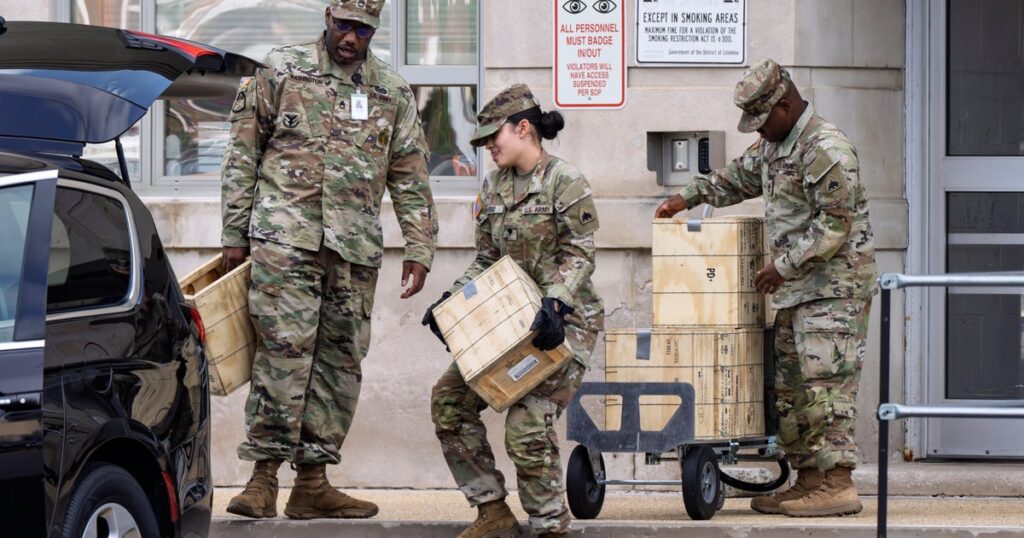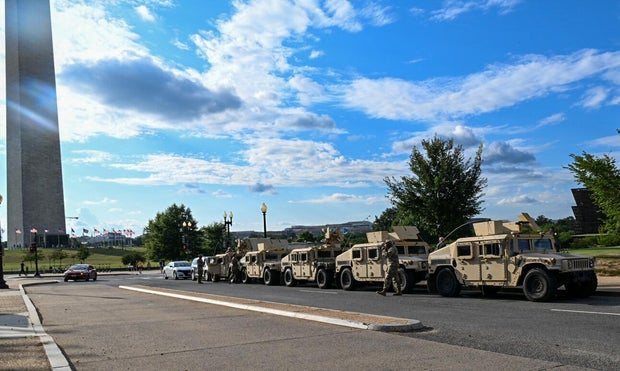Washington — President Trump announced this week the deployment of 800 members of the D.C. National Guard to the District of Columbia, as part of a push to crack down on crime in the nation’s capital.
The president is also temporarily taking control of the District’s Metropolitan Police Department. Hundreds of additional federal law enforcement officers have also joined the effort recently, from a variety of agencies fanning out across the city.
“I’m deploying the National Guard to help reestablish law, order and public safety in D.C., and they’re going to be allowed to do their job properly,” Mr. Trump said at a White House news conference Monday.
The Army has activated the D.C. National Guard to “assist law enforcement in the nation’s capital,” it said in a statement and added that of the approximately 800 soldiers activated, 100 to 200 would be supporting law enforcement at any given time on an “array of tasks from administrative, logistics and physical presence.”
Here’s what to know about the Trump administration’s deployment of federal law enforcement and National Guard troops in the District.
What is the National Guard doing in D.C.?
The District of Columbia is unique in that it’s controlled by the federal government, which means the president has authority over the D.C. National Guard.
For now, Defense Secretary Pete Hegseth says Guard members will be supporting federal agents, as they recently did in Los Angeles, when they were brought in after protests against Trump administration immigration policies to help protect federal property and personnel enforcing the policies.
The National Guard this week was activated under Title 32, which concerns the role of the Guard when it is under the control of its state’s governor, or in this case, the president. D.C. Guard members have the authority to make arrests while they’re in this status, but defense officials say that for now, the mission is focused on supporting law enforcement.
Hegseth said the Guard was formally mobilized Monday morning and would be “flowing into the streets of Washington in the coming week.” Asked by Fox News’ Laura Ingraham later that day whether the Guard troops would be detaining American citizens on U.S. soil, Hegseth replied, “Under Title 32, which is the authorization they’ll be using, they have broad latitude. But they’re not going to be involved in law enforcement functions.”
He elaborated on how they might be utilized, saying, “You can help somebody, interdict, temporarily detain like we did in Los Angeles, and hand over to law enforcement.”
And Hegseth also said the Guard members in D.C. are “going to be proactive.”
“If you take an action or a shot at them, there will be a consequence,” he told Ingraham.
The Army on Tuesday posted photos of the National Guard near the Washington Monument on X with the comment, “D.C. National Guard reporting for duty.” Some of the vehicles appeared to belong to the D.C. National Guard’s 273rd Military Police Company, which often helps with security for high-profile D.C. events like presidential inaugurations and Independence Day celebrations, the unit’s website says.
U.S. Army photos by Staff Sgt. Deonte Rowell, August 12, 2025, via X.
The Guard troops while in Title 32 status are not subject to the Posse Comitatus Act, which restricts the U.S. military from carrying out domestic law enforcement actions.
Members of the D.C. Guard deployed in Title 32 status in 2020, in response to protests over the killing of George Floyd, when the D.C. government requested additional manpower. They also deployed in Title 32 status in response to the Jan. 6, 2021 assault on the Capitol, after some delay.
There isn’t an end date for how long they can stay deployed this time. According to the executive order the president signed Monday, the deployment “shall remain in effect” until the president determines the “conditions of law and order have been restored in the District of Columbia.”
Before they’re sent to the D.C. streets, the service members will receive additional training on de-escalation tactics and rules for the use of force, according to defense officials.
Hegseth said Monday at the White House that other guardsmen from other states and other “specialized units” are prepared to deploy to D.C. if needed.
J. Scott Applewhite / AP
What is the president authorized to do with control of the D.C. police?
The Home Rule Act of 1973 created D.C.’s elected government and framework for its interaction with the federal government.
Section 740 of the law says “whenever the president of the United States determines that special conditions of an emergency nature exist which require the use of the Metropolitan Police force for federal purposes, he may direct the mayor to provide him, and the mayor shall provide, such services of the Metropolitan Police force as the president may deem necessary and appropriate.”
Under the president’s order, Drug Enforcement Administration Administrator Terry Cole is in charge of the daily D.C. Police operations, under the oversight of Attorney General Pam Bondi and Mr. Trump, according to White House press secretary Karoline Leavitt. Cole has also been directed to work with D.C. police chief Pamela Smith.
The law gives the president 48 hours to notify congressional leaders about his action, which Mr. Trump did on Monday. The president may remain in control of the D.C. police for up to 30 days, unless the House and Senate enact a joint resolution authorizing an extension.
Leavitt said the deployment would be reassessed at the end of the 30-day period.
The D.C. Police Department, which includes roughly 3,100 officers, has over 800 vacancies, according to the D.C. Police Union. The union, which is highly critical of D.C.’s mayor and city council, supports the federal takeover of the force.
Who are the other federal law enforcement officials deployed to the streets of D.C.?
Overnight Monday, about 850 officers and federal agents sent across the city made 23 arrests and seized six illegal handguns off the streets, Leavitt said Tuesday. The suspected offenses included homicide, firearms offenses, reckless driving, and driving under the influence, she said.
“This is only the beginning,” Leavitt said.
Participating members of what the White House is calling the Task Force’s Law Enforcement Working Group throughout the operation include the U.S. Capitol Police, Homeland Security Investigations, the Federal Protective Service, the DEA, the FBI, the Bureau of Alcohol, Tobacco, Firearms and Explosives, the Department of the Interior, the U.S. Secret Service, and the U.S. Marshals Service. The White House generally isn’t specifying which law enforcement entities are performing what responsibilities.
Homeless people being relocated
Leavitt said that the U.S. Park Police would continue to move homeless people off D.C. streets and suggested homeless shelters and mental health and addiction treatment centers are places they can go — or jail if they refuse.
Before Mr. Trump’s announcement Monday, the White House was already deploying federal law enforcement officers onto D.C. streets as a part of an effort to make the city cleaner and safer.
How D.C. officials are responding to the federal takeover
Attorney General Pam Bondi met Tuesday with D.C. Mayor Muriel Bowser, along with the FBI director, head of the U.S. Marshals Service, the DEA’s Cole and D.C. U.S. Attorney Jeanine Pirro. The attorney general characterized the meeting as “productive.”
But Bowser has called the president’s takeover of the D.C. police “unsettling and unprecedented,” although her criticism of the Trump administration’s move has been largely muted.
The White House and Bowser appear to have conflicting ideas about the chain of command for the D.C. police. Bowser on Tuesday said the president has the authority to request services of the police, but “our organizational chart, how we do business, how we fund the police, how we make changes, none of that has changed.” That view conflicts with Leavitt’s statement that Cole would be in charge of the police force, and would be overseen by the president and attorney general.
D.C. Police Chief Pamela Smith said the D.C. Police already work daily with federal law enforcement, and said she thinks an enhanced presence from the federal government may help.
“We know that we have to get illegal guns off of our street. And if we have this influx or enhanced presence, it’s going to make our city even better,” Smith said.
“I won’t go into the details of our operational plan at this point, but you will see the Metropolitan Police Department working side by side with our federal partners in order to enforce the efforts that we need around the city,” Smith said.
James LaPorta and
Jacob Rosen
contributed to this report.
https://www.cbsnews.com/news/national-guard-federal-law-enforcement-dc-restrictions/



